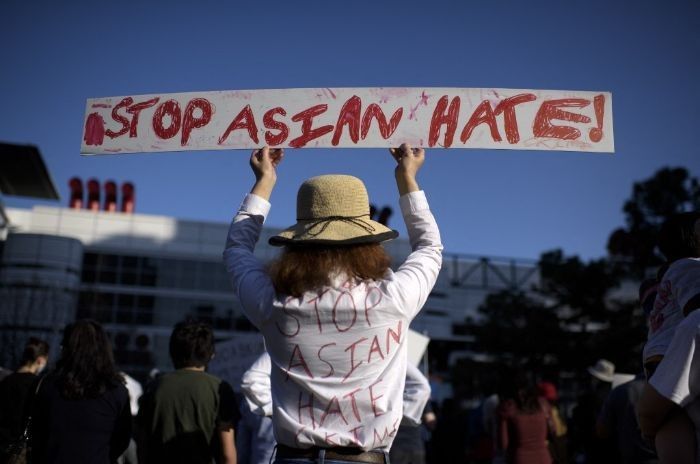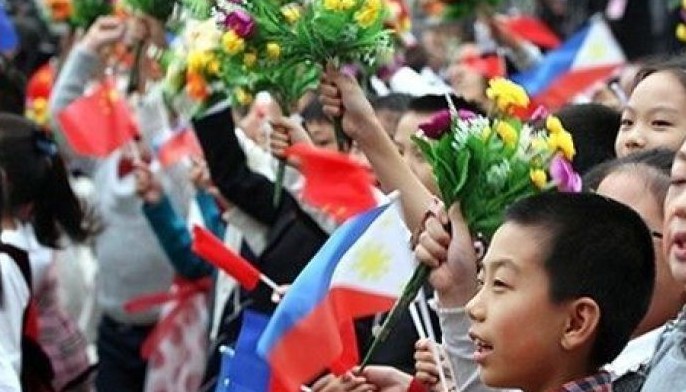As Filipinos decry anti-Asian attacks in the US, anti-Chinese sentiment festers at home

MANILA, Philippines — A gruesome attack perpetrated last month against a Filipino immigrant in New York City sparked outrage and horror in the Philippines.
It was the second assault on a Filipino immigrant in as many months and the latest in a string of anti-Asian hate crimes that have swept across the US — largely perceived to be the fallout of the racist language surrounding discussions of the COVID-19 pandemic.
But as Filipinos decry anti-Asian racism abroad, academics and members of the Filipino Chinese community in the Philippines say anti-Chinese sentiment is on the rise at home.
Dr. Jonathan Corpus Ong, associate professor of Global Digital Media at the University of Massachusetts Amherst, in an Internews report reelased earlier this year said "the Philippines was unfortunately no exception" to the "anti-China racist speech and conspiracy theory surged in the global context" in the wake of the pandemic.
In "Information Dystopia and Philippine Democracy," Ong said that what he called a "secondary contagion" of COVID-19 or the blaming of people of Chinese descent and Chinese culture for the virus, has also proliferated by Filipinos on social media. These views have consequences in the real world.
"The Philippines saw many incidents of physical altercations, parody and memes, racial slurs of 'chingchong,' and service refusals to mainland Chinese people unleashed by COVID-19."
'Race and politics are not the same'
“The primary cause of racism, really, is that, in general....people cannot distinguish between racial issues versus political issues,” Meah Ang See, president of Kaisa Para Sa Kaunlaran and director of Bahay Tsinoy, told Philstar.com.
See said she observed this in discussions online, citing, in particular, the discourse around the illegal vaccinations of both the Presidential Security Group and of Philippine Offshore Gaming Operator employees a few months ago.
Although the offense was the same, See said the groups were criticized in different ways.
"With the PSG, they're lambasted, and, you know, people are angry with them because it's so unethical, it's so illegal and you're supposed to be government," she said. "But with the arguments against the POGO, they weren't talking just about ethics. Ah, kasi, Intsik ka kasi, because they're Chinese, therefore, they will always do something illegal."
"[R]egardless of nationality, if it's a smuggled good...the issue should be dead there," she added. "[T]he discussions change and get distorted because a Chinese national or an ethnic Chinese is involved."
Filipinos of Chinese descent are not Chinese nationals
Another "information gap" that See says is endemic to the Philippines is the failure of many to differentiate between Filipinos of Chinese descent and Chinese nationals.
"I'm ethnic Chinese but I'm not a Chinese national. When I go to China, I'm a tourist. But we're all lumped together."
Meanwhile, for Ong, the conflating of racial and political issues can be traced to the anti-China narratives in Philippine politics.
While opposition candidates in 2019 took an anti-China stance in response to the Duterte administration's "increasingly cozy ties with the Chinese government," Ong noted that online discourse "at times...slipped into racist expressions against Chinese people."
Ong also called out journalists for being complicit in this disinformation by failing to fact-check racist statements, reproducing hateful rhetoric in their personal accounts, and publishing conspiracy theories in national newspapers.
See, who said she believed the media is generally careful in its reporting around Chinese nationals, also acknowledged that "[c]ommentaries and opinions from columnists are a different matter."
"Local journalists, activists, and academics need to develop a more sustained research agenda around hate speech and racism in the Philippines, attuned to the specific racial hierarchies and power dynamics in deep and recent historical context," Ong said.
Race-related violence in the Philippines?
While acknowledging that there is good reason to raise alarm over the Duterte administration's policy towards China, Ong warned that the same narrative "could lead to real-life violence."
He cited instances in Indonesia, where, he said, "a mix of conspiracy theory...election-related black campaigning, and COVID-19 related conspiracies about Chinese biological weaponry, has led to eruptions of physical violence, doxing, and shaming in social media."
"Unlike in the Philippines, Indonesia has a more recent history of racial violence against Chinese immigrants in their country," Ong noted, but also warned that the country must "prepare for scenarios where digital disinformation and hate speech converge and harm multicultural relations."
However, for See, a surge in race-related violence is not an imminent or likely threat in the Philippines. "History-wise, if you look at the historical trends of race-relations here in Asia, the Philippines [has] had the best ride."
"We're still very fortunate that it hasn't come to that and I don't think it will come to that," she said. "And we have a very strong academic community who really pave the way for understanding."
"In general, people do conflate different aspects of society and kinda like whittle it down to racial issues when you shouldn't but on the flip side you also have so many people who are able to differentiate issues and tackle issues head-on as issues and not racial tensions."
Where is the government in all this?
See also said that she cannot blame entirely those who generalize the Chinese, regardless of nationality, because she believes the government plays a "contributary" role in their poor perception by failing to penalize Chinese nationals who do participate in illegal activity in the country.
"The Chinese are illegal, the Chinese are all into these gambling, the Chinese are into exerting their power, the Chinese want to claim the Philippines, we can't blame the general public because the government has always had that stance," she said, referring to the government's pursuit of close ties with China.
"It's always extending their political hand to China, not protecting the sovereignty of our waters."
The government's failure to deport POGO workers also contributes to unflattering perceptions of the Chinese, according to See.
"It's more of really horrible people who happen to be Chinese nationals. They're here in the Philippines illegally. They are into gambling, the POGO, they are undesirable people, period. But they're the ones everybody sees and government's not doing anything about them."
"I[f] government already knows they're here illegally, I mean... it's called deportation. Why is it not happening?"
See added that POGOs are "coddled" in the Philippines in comparison to other Southeast Asian countries that have cracked down on their operations. Even Beijing has called on Manila to ban all online gambling in the country.
"We keep welcoming all of these gambling dens and then complain," she said.
"I'd go as far as blame the people who keep welcoming them into the country in the first place."
- Latest
- Trending


































